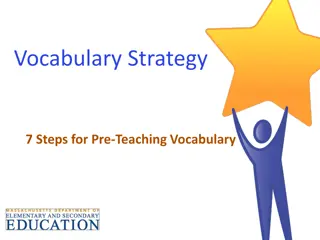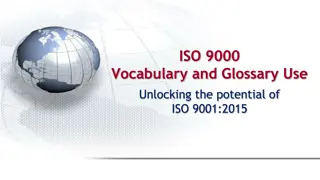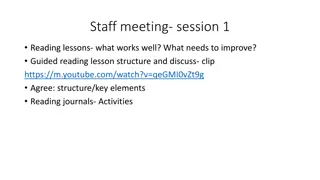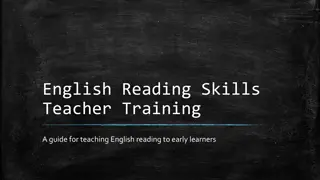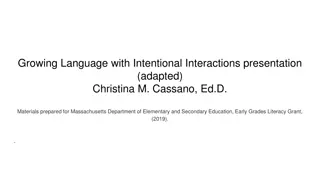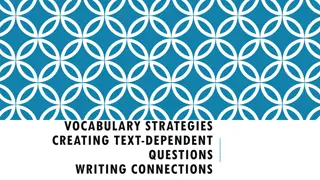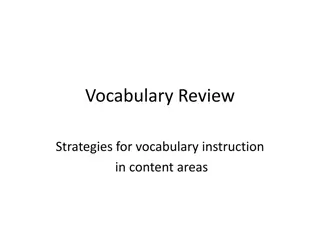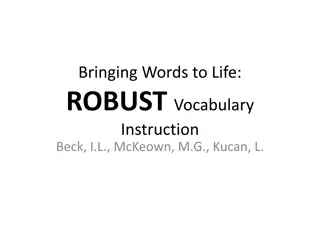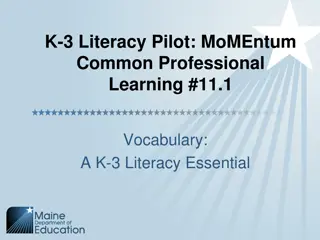Enhancing Vocabulary Through Effective Strategies
Diverse genres, utilize vocabulary building apps, engage in conversations, practice writing regularly, listen to English content, use a thesaurus and dictionary, and join a speech or debate club to enhance your vocabulary and expression skills. Self-reflection is key for continuous improvement.
Download Presentation

Please find below an Image/Link to download the presentation.
The content on the website is provided AS IS for your information and personal use only. It may not be sold, licensed, or shared on other websites without obtaining consent from the author.If you encounter any issues during the download, it is possible that the publisher has removed the file from their server.
You are allowed to download the files provided on this website for personal or commercial use, subject to the condition that they are used lawfully. All files are the property of their respective owners.
The content on the website is provided AS IS for your information and personal use only. It may not be sold, licensed, or shared on other websites without obtaining consent from the author.
E N D
Presentation Transcript
Vocabulary and expression development: Ienas Talib Naseef Department of English/ College of Education for Women University of Baghdad
Vocabulary and expression development: How to expand vocabulary and use the correct expressions to enhance the quality of speeches and conversations. Expanding your vocabulary and using the correct expressions are key to enhancing the quality of your speeches and conversations. Here are several effective strategies to help you improve in these areas: 1. Read Widely and Regularly Diverse Genres: Explore a variety of genres including fiction, non-fiction, scientific journals, and poetry. Different genres introduce you to different sets of vocabulary and expressions. Note New Words: When you encounter new words, jot them down, look up their meanings, and try to use them in sentences to reinforce their meanings. 2. Utilize Vocabulary Building Apps and Tools Apps: Use apps designed for vocabulary building. These often include games, quizzes, and flashcards, making learning new words engaging and effective. Online Tools: Websites and software that focus on language learning can also be helpful, providing resources and exercises for expanding your vocabulary.
3. Engage in Conversations with Diverse Groups Cultural Exchange: Interacting with people from various backgrounds can expose you to new idioms, phrases, and expressions, enriching your conversational skills. Professional Forums: Participating in discussions within professional forums or attending conferences related to your interests can introduce you to industry-specific terminology. 4. Practice Writing Regularly Journaling: Keeping a daily journal where you try to incorporate new words and expressions can be a practical way to practice. Creative Writing: Engaging in creative writing exercises, such as story writing or poetry, encourages you to experiment with language in unique ways.
5. Listen to and Watch Content in English Podcasts and Audiobooks: These can be great for exposure to new vocabulary and expressions in context, especially when they discuss topics of interest or are in your field of study or work. Movies and TV Shows: These not only entertain but also serve as valuable tools for understanding how language is used naturally, including slang, idioms, and colloquial expressions. 6. Use a Thesaurus and Dictionary Thesaurus: This tool is invaluable for learning synonyms and antonyms, which can help in making your speech or writing more sophisticated. Dictionary: Beyond just definitions, modern dictionaries often provide information about word origin, pronunciation, and examples of usage in sentences.
7. Join a Speech or Debate Club Practice Public Speaking: Clubs such as Toastmasters International provide a supportive environment to practice speaking, receive feedback, and learn from others. Engage in Debates: Debating helps in sharpening your quick thinking and application of language to argue effectively and persuasively. 8. Reflect and Adapt Self-Reflection:After conversations or presentations, reflect on what went well and what could be improved. Consider the effectiveness of your vocabulary and expressions. Seek Feedback:Ask for feedback from peers, mentors, or instructors on your choice of words and expressions.
9. Set Specific Goals Daily Goals:Aim to learn and use a certain number of new words each day. Contextual Learning: Focus on learning vocabulary and expressions relevant to specific situations or topics you're interested in. 10. Practice, Practice, Practice Consistent Application: The key to mastering new vocabulary and expressions is using them as often as possible in your daily communication. By incorporating these strategies into your routine, you'll gradually expand your vocabulary and enhance your ability to express yourself more effectively and confidently in both speeches and conversations



